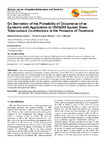On Derivation of the Probability of Occurrence of an Epidemic with Application to HIV/AIDS Spread Given Tuberculosis Co-infections in the Presence of Treatment

View/
Date
2017Author
Simwa, Richard Onyino
Muhati, Nelson Lwoyelo
Chikamai, Lucy
Metadata
Show full item recordAbstract
Human Immunodeficiency Virus (HIV) and Mycobacterium Tuberculosis (TB) infections are two major world’s public health problems especially in developing countries. Worldwide, 13% of TB cases are estimated to be co-infected with HIV and about a third of 33 million people living with HIV are infected with the bacterium that causes TB. Deterministic models are derived and applied to estimate the basic reproduction number of HIV and TB co-infection as a single output value by treating each of the parameter input as a constant value. In this paper the basic reproduction number is modeled as a random variable, then the probability that there will bean epidemic, is derived and computed. In particular it is shown that for the sub-Saharan region, the probability of the epidemic occurring is 7.9%, as expected since an epidemic is generally a rare event. This research, thus develops the methodology for the computation of the probability of occurrence of an epidemic, which is useful for the public health policy formulation
